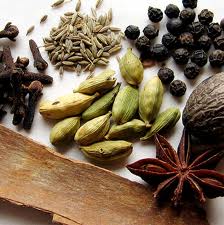Want to Lose the Spare Tire? Learn to Cook with Herbs and Spices
 Friday, November 26, 2010 at 8:50AM
Friday, November 26, 2010 at 8:50AM The unwanted metabolic guests, hyper- and dyslipidemia--conditions in which the body's ability to metabolize fat goes haywire--are risk factors for cardiovascular disease, the primary cause of death in industrialized countries. And activation of a cell signaling pathway known as PPAR (Peroxisome proliferators-activated receptor a) is involved in various mechanisms that improve these condititons and thus improve fat metabolism. Now European researchers have tested various plant extracts and their compounds to determine whether they stimulated PPAR α activity in vitro. Out of 34 tested plant extracts, nine exhibited low to moderate PPAR α transactivation, including caraway, chili pepper, nutmeg, licorice, black and white pepper, paprika, coriander, saffron, and stevia tea.
The active components of black pepper and chili pepper, piperine, and capsaicin exerted the highest fat-busting activities. (This supports previous research about chili peppers.) Resveratrol (thought to be the explanation for the"French paradox"--eating fatty foods, drinking lots of wine and staying thin) only slightly activated PPAR α. These results suggest that a diet rich in fruit, herbs, and spices provides a number of PPAR α agonists that might contribute to an improved lipid profile and cardiovascular health.
Of course, this was all done in a testube, not verified in people. But there is no harm in eating more herbs and spices--unless of course you have a bad case of acid reflux.
 PPAR,
PPAR,  cardiovascular,
cardiovascular,  fat metabolism,
fat metabolism,  herbs,
herbs,  lipids,
lipids,  spices
spices 